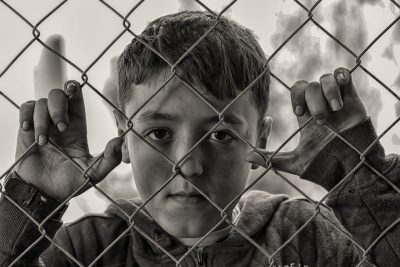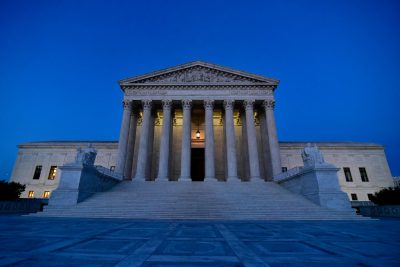Due Process and the Courts
What does the constitution say about due process?
The Fifth Amendment to the Constitution says clearly that no person shall be deprived of life, liberty, or property without the due process of law. Note that this says person, not citizen, and over the years the Supreme Court has consistently ruled that the Due Process Clause applies to all people in the United States.Do non-citizens have the right to due process in the U.S.?
Yes. The Constitution guarantees due process rights to all "persons," not just citizens. This means non-citizens, including undocumented immigrants, are entitled to fair treatment under the law. This includes the right to defend themselves in court. But recent Trump administration policies that speed up deportations and limit access to legal representation make it harder for non-citizens to get their fair day in court.- Access to legal representation Access to legal counsel is an essential part of our justice system and our democracy. In the criminal justice system, anyone facing even one day in jail gets a lawyer if they can't afford one. But immigrants facing deportation usually don't get that chance.The research is clear – the most effective way to ensure some level of due process for people navigating our complicated immigration system is for them to have trained attorney at their side. But Trump administration is now working to strip attorneys from as many people as possible, all in the name of increasing its deportation numbers. This attempt to eliminate basic due process will hurt people who already have few options.
- Fair day in court Due process guarantees that individuals have the opportunity to defend themselves in court. This includes non-citizens facing deportation.
Why is due process important?
We are seeing right now the importance of due process when it comes to President Trump's actions to carry out the so-called Alien Enemies Act, a 1798 wartime law that permits people to be deported outside of the normal framework of immigration law. President Trump has alleged that this law allows him to simply point at any person, declare them to be an alien enemy, and kick them out of the country without ever having a chance to see a judge. Thankfully, the Supreme Court said that is not true, and in a unanimous decision, ruled that people can challenge the Trump administration's invocation of the Alien Enemies Act. That is why due process is so important, because it means that no person can be rounded up and sent to another country without a chance to go to court and make the government prove their case.How is the American Immigration Council working to protect due process?
- We serve thousands of individuals in immigration detention centers through the Immigration Justice Campaign, our initiative with the American Immigration Lawyers Association. The Justice Campaign provides free legal services for immigrants who would otherwise have to navigate our complicated immigration system without a lawyer.
- We use the courts to demand a fair process for immigrants. Our litigation team is fighting back against the Trump administration’s blatant disregard for due process including filing a lawsuit challenging their illegal detention of immigrants in El Salvador’s notorious Terrorism Confinement Center (CECOT).

Three-Year-Old Immigrant Child Released After Two Years of Detention
An immigration judge ordered the immediate release of a three-year-old immigrant child and his mother from a detention center in rural Pennsylvania on Monday, stating that it was one of the most sympathetic cases for release he had encountered in his career. The child’s release marks what will hopefully be… Read More

Government Moves to Curb Non-Citizens’ Ability to Get More Time to Prepare for Hearings
In a move to reduce the number of times immigration judges reschedule immigration hearings, the Executive Office for Immigration Review (EOIR) recently issued guidance suggesting judges should change practices regarding “continuances.” A continuance, which only may be granted for “good cause,” is a critically important option for individuals who… Read More

Motions to Suppress in Removal Proceedings: Fighting Back Against Unlawful Conduct by U.S. Customs and Border Protection
This Practice Advisory addresses some of the legal issues that may arise when noncitizens in removal proceedings seek to suppress evidence unlawfully obtained by Customs and Border Protection officers. Read More

Massachusetts’ Highest Court Declares Immigration Detainers Are Unenforceable
The Massachusetts Supreme Judicial Court issued a unanimous decision on Monday holding that Massachusetts court officers may not arrest and detain immigrants based solely on a detainer. Although other courts have struck down detainers on the grounds that they violate the Constitution, the Supreme Judicial Court concluded that… Read More

Trump Administration Targeting Immigrant Children Is a New Low
The recent trend of broadly labeling unaccompanied immigrant children as criminals and gang members is just the latest in a series of attacks on some of the most vulnerable individuals in the U.S. immigration system. In reality, most immigrant children from Honduras, El Salvador, and Guatemala are fleeing the very… Read More

Data Shows Prosecutorial Discretion Grinds to a Halt in Immigration Courts
The Department of Justice (DOJ) announced last month that it now has hired 326 immigration judges, 53 more judges than July 2016, yet during that time the immigration court backlog has grown. According to new data released by the Transactional Records Access Clearinghouse (TRAC) the reason for… Read More

Hawaii Judge Rules That Grandparents and Other Close Relatives Are Excluded from the Travel Ban
U.S. District Judge Derrick Watson ruled last week that “grandparents, grandchildren, brothers-in-law, sisters-in-law, aunts, uncles, nieces, nephews, and cousins of persons in the United States,” as well as refugees connected to resettlement agencies should be exempt from the Trump administration’s travel ban. This ruling came as a result of a… Read More

Supreme Court Limits Power to Revoke Naturalized Person’s Citizenship
The Supreme Court recently rejected the government’s extreme argument that any false statement given during a naturalization exam—even a misstatement that had no impact on the naturalization decision—could later be a basis for stripping the person of their citizenship. In Maslenjak v. United States, the government’s interpretation of… Read More

Court Rules That Immigration Authorities May Not Deny Bond Hearings to Children
The Ninth Circuit Court of Appeals delivered a strong rebuke to the government’s years-long effort to strip detained immigrant children of the right to a bond hearing in immigration court. The 3-0 decision, authored by Judge Reinhardt on Wednesday, came in a case involving the 1997 Flores settlement… Read More

Court Finds Government Violating Obligations (Again) to Children in Family Detention
A U.S. District Court condemned the federal government for continuing to disregard critical protections for children in detention. Read More
Make a contribution
Make a direct impact on the lives of immigrants.
